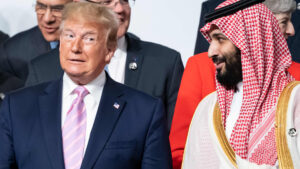Gulf States Brace for Economic Shifts Amid Tariff Talks and Oil Price Volatility
As the global economy grapples with the repercussions of U.S. tariff policies, the wealthy Gulf Cooperation Council (GCC) countries find themselves in a unique position. With an estimated $3.2 trillion in sovereign financial assets, representing 33% of the world’s total sovereign wealth, the Gulf states—comprising Saudi Arabia, the UAE, Bahrain, Kuwait, Oman, and Qatar—are navigating these changes with a mix of confidence and caution. However, the volatility in oil prices poses a significant challenge that could threaten their ambitious economic plans.
Strength in Numbers
According to GCC Secretary-General Jasem Mohamed Albudaiwi, the bloc also controls approximately 32.6% of the world’s proven crude oil reserves. This reality provides both a strategic advantage and a vulnerability. U.S. President Donald Trump’s administration has consistently pressured the Organization of the Petroleum Exporting Countries (OPEC), led by Saudi Arabia, to increase oil production in a bid to lower prices and combat domestic inflation. This creates a paradoxical situation for the GCC nations, where lower oil prices can undermine their national budgets and development projects, despite their attempts to diversify their economies beyond hydrocarbon revenues.
A Delicate Diplomatic Balance
The GCC’s relationship with the U.S. has been warm under President Trump, which some economists believe will help shield the region from the full brunt of the tariffs. Ben Powell, BlackRock’s chief investment strategist for Asia-Pacific and the Middle East, suggests that the Gulf’s robust ties with Washington enhance its negotiating power in trade discussions. Additionally, the GCC’s proactive diplomatic role—such as hosting peace talks to address the ongoing Russia-Ukraine conflict—serves to further integrate them into global economic dialogues, thereby increasing their importance in U.S. foreign policy considerations.
"In the storm of economic changes, the Middle East’s strong financial foundation will position it as a potentially successful player in emerging markets,” Powell noted in his analysis. The GCC, particularly the UAE, appears well-prepared to face tariff headwinds, as Monica Malik, Chief Economist at Abu Dhabi Commercial Bank, asserts that the U.S. is not a major export market for the Gulf, with exports averaging only 3.7% of the GCC’s total.
The Oil Price Quandary
While the GCC may navigate tariff implications relatively unscathed, the forecast for oil prices presents a more pressing concern. The significant reliance on hydrocarbon revenues makes the region’s fiscal health extraordinarily sensitive to fluctuations in oil market dynamics. Currently, Saudi Arabia requires oil prices to exceed $90 per barrel to balance its budget, a target that’s becoming increasingly elusive. The International Monetary Fund (IMF) recently indicated that the global oil benchmark, Brent crude, is expected to hover around $58 per barrel by 2026—a far cry from what’s needed for the Kingdom to sustain its grand Vision 2030 ambitions.
The ongoing uncertainty is palpable: Brent crude is presently trading at around $61.44 per barrel, nearly 17% lower year-to-date. The decision by OPEC+ to increase production has only added to this bearish sentiment, raising concerns about oversupply in the market. Malik warns that a significant and sustained drop in oil prices would necessitate a reevaluation of national budgets and spending plans across the Gulf, potentially affecting everything from capital expenditures to overall economic confidence.
Forging Ahead
Despite these challenges, the GCC countries remain steadfast in their long-term visions. Initiatives aimed at diversifying economies, reducing dependency on oil, and fostering innovation in sectors such as technology and tourism are essential steps toward sustainability. The region’s wealth and its growing global significance in geopolitical matters may serve as bulwarks against the economic storms ahead.
For more in-depth coverage on how the Gulf states are responding to these economic shifts and strategic insights into investment opportunities, stay tuned with Extreme Investor Network.
Conclusion
In a rapidly evolving global economy, the Gulf Cooperation Council’s ability to adapt and thrive amidst tariff ramifications and fluctuating oil prices will ultimately determine its future trajectory. With keen insights and a solid economic foundation, the GCC is poised to navigate these challenges, but vigilance and strategic foresight remain crucial as they forge their path forward. Join us as we continue to explore and analyze these pivotal developments.

